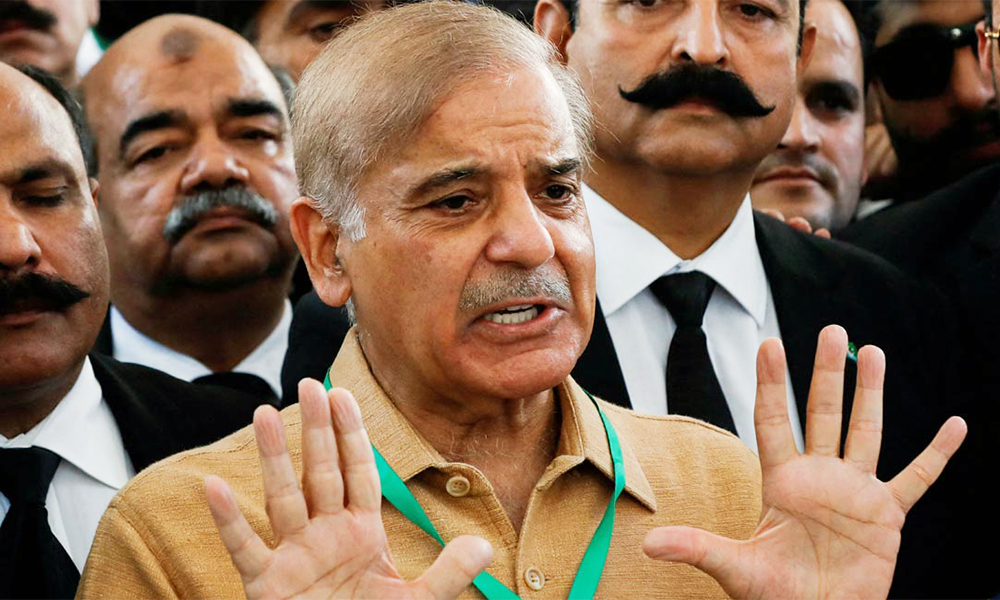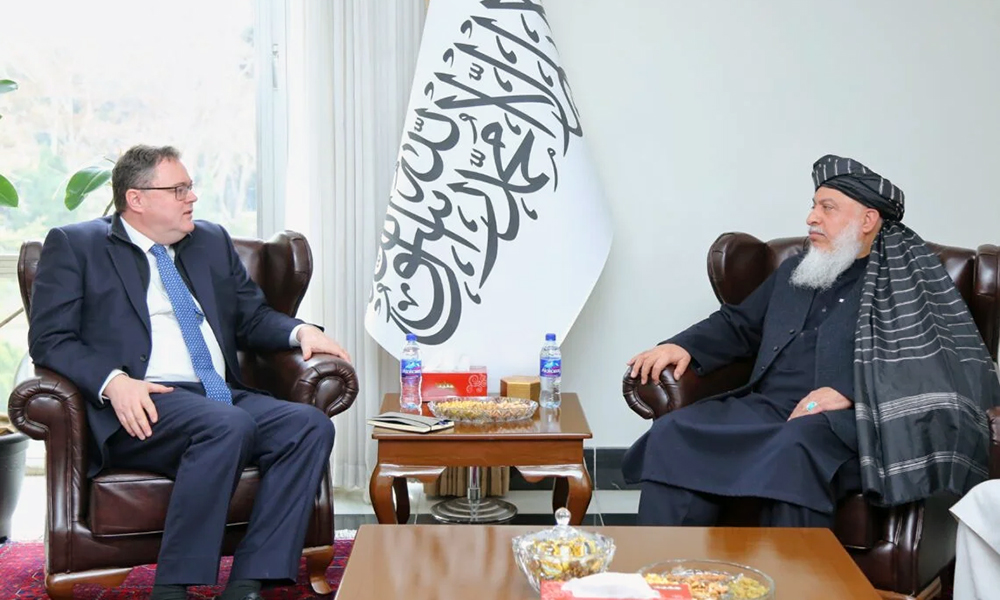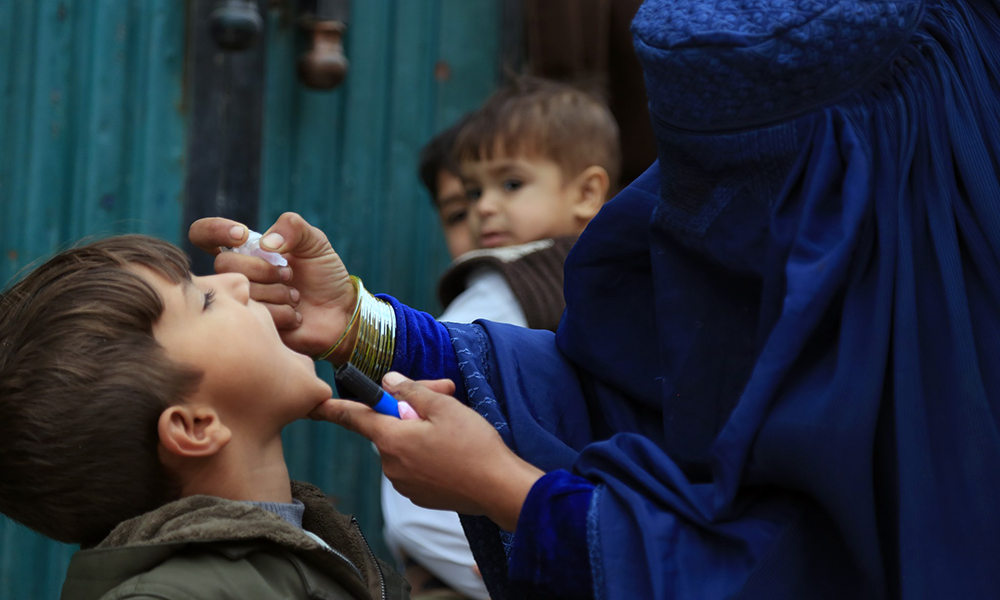Latest News
Political change in Pakistan as Shehbaz Sharif seeks to become PM

Opposition politician Shehbaz Sharif submitted his nomination to be Pakistan's next prime minister to the legislature on Sunday, his party said, after incumbent Imran Khan lost a no-confidence vote in parliament after nearly four years in power.
The younger brother of three-times prime minister Nawaz Sharif, Shehbaz, 70, has led a bid by the opposition in parliament to topple former cricket star Khan, and he is widely expected to replace him following a vote on Monday.
But Khan's party also submitted papers nominating the former foreign minister as a candidate, saying their members of parliament would resign en masse should he lose, potentially creating the need for urgent by-elections for their seats.
Khan, the first Pakistani prime minister to be ousted by a no confidence vote, had clung on for almost a week after a united opposition first tried to remove him.
On Sunday, he repeated allegations that a foreign conspiracy was behind the regime change.
"The freedom struggle begins again today," he said via his Twitter account, which is followed by more than 15 million and still describes him as Prime Minister of Pakistan in his biography section.
Even before the vote Khan had called for protests, which were expected to take place late on Sunday.
"I tell all of my supporters across Pakistan, on Sunday, after Isha (evening) prayers, you all have to come out of your homes and protest peacefully against this imported government that is trying to come to power," he said in an address to the nation on Friday.
His government fell in the early hours of Sunday after a 13-hour session that included repeated delays and lengthy speeches by lawmakers from his Pakistan Tehreek-e-Insaf party.
Opposition parties were able to secure 174 votes in the 342-member house for the no-confidence motion, giving them the majority they needed to enable Monday's vote to elect a new premier.
Khan's former information minister Fawad Chaudhry told reporters of the plan for resignations if their nominee does not win.
The speaker would be obliged to accept those resignations that would necessitate by-elections in probably more than 100 seats.
That could plunge the country into another crisis as the election commission has previously said it would not be ready to hold elections until October.
ROLE OF MILITARY?
Two sources who declined to be identified said the vote that ousted Khan went ahead after the powerful army chief, General Qamar Javed Bajwa, met Khan, as criticism mounted over the delay to the parliamentary process. The Supreme Court has also ordered parliament to convene and hold the vote.
The military has ruled the country of 220 million people for almost half its nearly 75-year history.
It viewed Khan and his conservative agenda favourably when he won election in 2018, but that support waned after a falling-out over the appointment of the influential military intelligence chief and economic troubles that led to the largest interest rate rise in decades this week.
Khan had antagonised the United States throughout his tenure, welcoming the Islamic Emirate (IE) takeover of Afghanistan last year and more recently accusing the United States of being behind the attempt to oust him. Washington dismissed the accusation.
Shehbaz Sharif said Khan's departure was a chance for a newbeginning.
"A new dawn has started ... This alliance will rebuildPakistan," he told parliament on Sunday.
Sharif was for years chief minister of Punjab province and has a reputation as an effective administrator.
His first tasks would be to repair relations with the powerful military as well as ally the United States, and tend to a stuttering economy.
Some analysts say navigating major political and economic hurdles with a united front would be a challenge for the new coalition, which comprises several diverse political parties.
"There are going to be divisions and divergences within the key coalition partners," said Mosharraf Zaidi, senior fellow at thinktank Tabadlab, adding the first likely hurdle would be the raising of fuel prices in coming days.
"They are going to face both internal resistance within the coalition and possibly even criticism by coalition members and that will be in the first few days, not even weeks," he added.
Latest News
Norwegian Chargé d’Affaires meets with IEA deputy foreign minister
Welcoming the diplomat’s visit to Kabul, Stanikzai underscored the importance of political relations between Afghanistan and Norway, the foreign ministry said in a statement.

The Norwegian Chargé d’Affaires for Afghanistan, Per Albert Ilsaas, on Saturday met with IEA’s Deputy Foreign Minister for Political Affairs, Sher Muhammad Abbas Stanikzai, in Kabul.
Welcoming the diplomat’s visit to Kabul, Stanikzai underscored the importance of political relations between Afghanistan and Norway, the foreign ministry said in a statement.
In addition to focusing on bilateral political, humanitarian, and other pertinent issues, the two sides expressed hope that continued engagement would lead to constructive solutions to related issues.
This comes two weeks after the Foreign Ministry Spokesman Abdul Qahar Balkhi expressed disappointment regarding the decision by the Norwegian government to downgrade diplomatic relations with Afghanistan.
Balkhi said in a post on X that such decisions should not be linked with internal affairs of other countries.
“Diplomatic engagement is most effective when it fosters mutual understanding and respect, even amidst differing viewpoints,” he stated.
“Access to consular services is a fundamental right of all nationals. We strongly urge all parties to prioritize this principle in the spirit of international cooperation,” he added.
Latest News
A new polio vaccination campaign is set to launch in Afghanistan
Afghanistan and Pakistan are the only two countries in the world where polio has not been eradicated.

The “Afghanistan Polio-Free” organization announced that a new round of polio vaccinations will begin on Monday, December 23, in various provinces of Afghanistan.
The organization did not specify which provinces will be targeted or how long the vaccination campaign will last.
Afghanistan and Pakistan are the only two countries in the world where polio has not been eradicated.
On December 4, 2023, the World Health Organization (WHO) issued a statement reporting a 283% increase in polio cases in Afghanistan. According to the WHO, the number of positive environmental samples for wild poliovirus type 1 in Afghanistan in 2024 reached 84, compared to 62 cases in 2023.
The Ministry of Public Health claimed in November 2024 that no new cases of polio had been reported in Afghanistan for the year.
Latest News
G7 envoys urge national dialogue for lasting stability in Afghanistan

Special Representatives of the Group of Seven (G7), including the European Union, have emphasized the importance of a national dialogue for achieving long-term stability in Afghanistan.
Following a meeting on Afghanistan in Geneva, Switzerland, G7 special envoys issued a joint statement calling for the restoration of women's rights and urging the Islamic Emirate to fight terrorism.
The statement reads: "Achieving sustainable peace and stability requires credible governance that represents all segments of Afghan society."
The representatives also expressed concern over the IEA’s decision to ban girls from attending medical institutes, warning that it will have devastating consequences for the citizens, particularly mothers and their infants.
The statement described this ban as unacceptable and called on the Afghan authorities to lift it immediately.
Earlier, countries and international organizations had called for the removal of restrictions on the education and employment of women and girls, emphasizing the need for a national dialogue.
In response to these concerns, IEA has repeatedly stated that it will not allow interference in the internal affairs of the country.
The G7 special envoys also expressed their concern about the recent terrorist attacks in Kabul and the surrounding region, warning that terrorism remains a serious threat to Afghanistan's security. They confirmed the actions of the IEA against Daesh but stressed the need for more decisive measures.
-

 Sport5 days ago
Sport5 days agoLanka T10: All three matches abandoned due to rain
-

 Latest News5 days ago
Latest News5 days agoIndia hoping to import coal and marble from Afghanistan
-

 Sport4 days ago
Sport4 days agoZimbabwe’s opening ODI against Afghanistan abandoned
-

 Latest News5 days ago
Latest News5 days agoJapan announces $27.5 million aid package to Afghanistan
-

 Latest News1 day ago
Latest News1 day agoAfghan men must stand with women to support viable future of country: US envoy
-

 World3 days ago
World3 days agoNorth Korean troops suffer 100 deaths, struggling in drone warfare, South Korea says
-

 Latest News3 days ago
Latest News3 days agoTwo horror accidents on Kabul-Kandahar highway leave 52 dead
-

 International Sports4 days ago
International Sports4 days agoLanka T10: Kandy Bolts in at 4th spot in playoffs after thrilling day
























